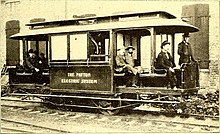
The Patton Motor Company was a street car manufacturer in Chicago.
History
The Patton Motor Company was based in 340 and 342 Dearborn St., Chicago, where it manufactured around 1898 patented electric street cars. These were used as a feeder for trolley lines, for nightwork or for long distance work. They were particularly adapted for service where, because of operating expense, the trolley equipment was unsatisfactory. They required no poles, no wires, no power house, no bonding of rails but only ordinary track. The company guaranteed to provide street car service under average conditions for less than two cents per car mile for power. [1]
A gasoline engine was used to drive a dynamo, which in turn operated the electric motor. The principal claim of the inventor was the use of a storage battery, which accumulated the power of the dynamo, when on a down grade, or at rest, and which was automatically connected in to assist when the work was heavy.
The gasoline was stored in a tank in the roof of the car. The tank capacity of 23 gallons (87 litres) was sufficient for 150 miles (240 km). During a trial run at Racine, Wisconsin on 8 July 1896 over the line of the Chicago, Milwaukee, St. Paul & Pacific Railroad the car attained at times speeds of 25 miles per hour (40 km/h) and surmounted grades of up to 55 feet to the mile (10 ‰) without difficulty beyond perceptibly slowing down. [2]
The motor cars were used as a smoking car and motor at the Chattagnooga Rapid Transit Company and as an independent motor by the Cedar Falls (Iowa) & Normal Railway. [3] A combination double truck car was also on offer. [4]
References
-
^
Patton Motor Company: As a Feeder for Trolley Lines. In: Street Railway Journal, Vol. 14, No. 1, January 1898, p. 139.
 This article incorporates text from this source, which is in the
public domain.
This article incorporates text from this source, which is in the
public domain.
-
^ Thomas Manz Collection:
The Patton Electric System. Racine Newspaper, July 1896.
 This article incorporates text from this source, which is in the
public domain.
This article incorporates text from this source, which is in the
public domain.
- ^ Patton Motors are no longer an Experiment. In: Street Railway Journal, September 1898, p. 74.
- ^ The Patton Motor Co. guarantees the perfect working of this system. In: Street Railway Journal, September 1898, p. 75.